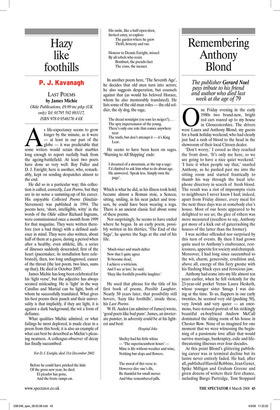Hazy like foothills
P. J. Kavanagh
LAST POEMS by James Michie Oldie Publications, £9.99 inc p&p (UK only) Tel: 01795 592 893117, ISBN 978 0 9548176 4 0X As life-expectancy seems to grow longer by the minute, as it were — at least in our part of the globe — it was predictable that some writers would retain their marbles long enough to report ruefully back from the ageing-battlefield. At least two poets have done so very well: Roy Fuller and D. J. Enright; here is another, who, remarkably, kept on sending despatches almost to the end.
He did so in a particular way; this collection is called, correctly, Last Poems, but they are in no sense a summing-up of his career. His enjoyable Collected Poems (SinclairStevenson) was published in 1994. The poems here, ‘short, intelligible, witty’ in the words of the Oldie editor Richard Ingrams, were commissioned once a month from 1999 for that magazine. They were written therefore (not a bad thing) with a defined audience in mind. They were also written, about half of them at a guess, during a period when after a healthy, even athletic, life, a series of illnesses suddenly descended; first of the heart (pacemaker, its installation here celebrated), then, too long undiagnosed, cancer of the throat (the last poem, two lines, sums up that). He died in October 2007.
James Michie has long been celebrated for his ‘light verse’, but the adjective has always seemed misleading. He is ‘light’ in the way Catullus and Martial can be light, both of whom he successfully translated. What gives his best poems their punch and their universality is that implicitly, if they are light, it is against a dark background, the wit a form of defiance.
What qualities Michie admired, or what failings he most deplored, is made clear in a poem from this book; it is also an example of what can best be described as Michie’s pleasing neatness. A colleague-observer of decay has finally succumbed:
For D. J. Enright, died 31st December 2002 Before he could have pricked the hide Of the gross new year, he died. El picador has gone, And the brute ramps on. His smile, like a half-open door, Invited entry, to explore The garden where he grew Thrift, honesty and rue.
Honour to Dennis Enright, missed By all rebels who resist Bombast, the pseudo-fact The crass, the inexact.
In another poem here, ‘The Seventh Age’, he decides that old men turn into actors; he also suggests desperation, but counsels against that (as would his beloved Horace, whom he also memorably translated). He lists some of the old-man roles — the old soldier, the sly dog, the sage,
The dread nostalgist (ou sont les neiges?)... . The spry impersonator of the young. There’s only one role that comes anywhere near The truth, but don’t attempt it — it’s King Lear.
He seems to have been keen on sages. ‘Warning to All Shipping’ ends:
I dreamed of a mountain, at the top a sage: I’d climbed to ask him what to do about age. He answered, ‘Speak less. Simply turn the page’.
Which is what he did, as his illness took hold; became almost a Roman stoic, a Seneca; sitting, smiling, in his neat jacket and trousers, he could have been wearing a toga. There is an ancient classic feel about some of these poems.
Not surprisingly, he seems to have ended where he began. In an early poem, possibly written in his thirties, ‘The End of the Sage’, he quotes the Sage at the end of his life.
‘Much wiser and much dafter Now that I quite agree To become dead, I achieve a witticism, And I see at last,’ he said, ‘Hazy like foothills possible laughter.’
He used that phrase for the title of his first book of poems, Possible Laughter. Nearly 50 years later, that possibility still hovers, ‘hazy like foothills’, inside these, his Last Poems.
W. H. Auden (an admirer of James) wrote, ‘good poets like bad puns’. James, an inveterate punster, in adversity could be at his lightest and best:
Hospital Joke Shelley had his little whine — ‘The superincumbent hours’ Mine is life without weather and wine, Nothing but slops and flowers.
The moral of this verse is: However dire one’s ills, Be thankful for small nurses And blue remembered pills.


















































































 Previous page
Previous page